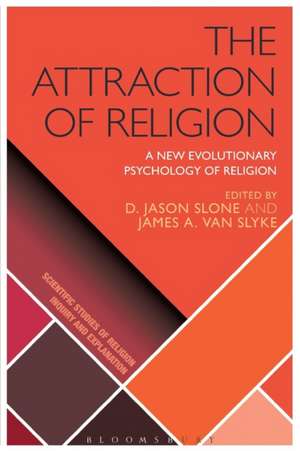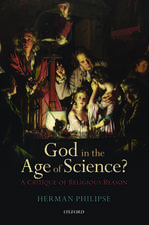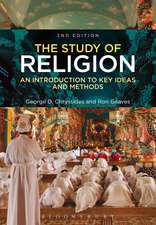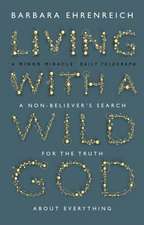The Attraction of Religion: A New Evolutionary Psychology of Religion: Scientific Studies of Religion: Inquiry and Explanation
Editat de D. Jason Slone, Professor James A. Van Slykeen Limba Engleză Paperback – 24 aug 2016
| Toate formatele și edițiile | Preț | Express |
|---|---|---|
| Paperback (1) | 238.11 lei 43-57 zile | |
| Bloomsbury Publishing – 24 aug 2016 | 238.11 lei 43-57 zile | |
| Hardback (1) | 774.46 lei 43-57 zile | |
| Bloomsbury Publishing – 25 feb 2015 | 774.46 lei 43-57 zile |
Din seria Scientific Studies of Religion: Inquiry and Explanation
- 22%
 Preț: 149.02 lei
Preț: 149.02 lei - 23%
 Preț: 192.55 lei
Preț: 192.55 lei - 30%
 Preț: 511.64 lei
Preț: 511.64 lei - 23%
 Preț: 191.75 lei
Preț: 191.75 lei - 21%
 Preț: 218.65 lei
Preț: 218.65 lei - 21%
 Preț: 218.09 lei
Preț: 218.09 lei - 23%
 Preț: 229.41 lei
Preț: 229.41 lei - 13%
 Preț: 194.06 lei
Preț: 194.06 lei - 24%
 Preț: 190.16 lei
Preț: 190.16 lei - 21%
 Preț: 217.91 lei
Preț: 217.91 lei - 13%
 Preț: 237.57 lei
Preț: 237.57 lei - 24%
 Preț: 190.06 lei
Preț: 190.06 lei - 22%
 Preț: 231.63 lei
Preț: 231.63 lei - 24%
 Preț: 190.06 lei
Preț: 190.06 lei - 23%
 Preț: 191.67 lei
Preț: 191.67 lei - 23%
 Preț: 191.38 lei
Preț: 191.38 lei - 30%
 Preț: 596.81 lei
Preț: 596.81 lei - 22%
 Preț: 225.12 lei
Preț: 225.12 lei - 21%
 Preț: 217.82 lei
Preț: 217.82 lei - 22%
 Preț: 237.93 lei
Preț: 237.93 lei - 22%
 Preț: 256.20 lei
Preț: 256.20 lei - 23%
 Preț: 191.38 lei
Preț: 191.38 lei - 23%
 Preț: 255.66 lei
Preț: 255.66 lei - 30%
 Preț: 512.37 lei
Preț: 512.37 lei - 13%
 Preț: 257.03 lei
Preț: 257.03 lei - 30%
 Preț: 511.07 lei
Preț: 511.07 lei - 30%
 Preț: 717.79 lei
Preț: 717.79 lei
Preț: 238.11 lei
Preț vechi: 305.93 lei
-22% Nou
Puncte Express: 357
Preț estimativ în valută:
45.60€ • 46.98$ • 38.20£
45.60€ • 46.98$ • 38.20£
Carte tipărită la comandă
Livrare economică 24 februarie-10 martie
Preluare comenzi: 021 569.72.76
Specificații
ISBN-13: 9781350005280
ISBN-10: 1350005282
Pagini: 272
Ilustrații: 15 bw illus
Dimensiuni: 156 x 234 x 14 mm
Greutate: 0.38 kg
Ediția:NIPPOD
Editura: Bloomsbury Publishing
Colecția Bloomsbury Academic
Seria Scientific Studies of Religion: Inquiry and Explanation
Locul publicării:London, United Kingdom
ISBN-10: 1350005282
Pagini: 272
Ilustrații: 15 bw illus
Dimensiuni: 156 x 234 x 14 mm
Greutate: 0.38 kg
Ediția:NIPPOD
Editura: Bloomsbury Publishing
Colecția Bloomsbury Academic
Seria Scientific Studies of Religion: Inquiry and Explanation
Locul publicării:London, United Kingdom
Caracteristici
First book to focus on sexual selection and evolutionary theories as an explanation for religion
Notă biografică
D. Jason Slone is Associate Professor of Psychology and Humanities at the School of Arts and Sciences, Tiffin University, USA.James A. Van Slyke is Assistant Professor of Psychology at Fresno Pacific University, USA.
Cuprins
List of FiguresAcknowledgementsIntroduction. Connecting Religion, Sex, and Evolution, Jason Slone (Professor of Cognition and Culture, School of Arts & Sciences, Tiffin University, USA) & James Van Slyke (Assistant Professor of Psychology, School of Humanities, Religion & Social Sciences, Fresno Pacific University, USA)Chapter 1. Why Don't Abstinence Programs Work? (and other Puzzles), James Van Slyke (Assistant Professor of Psychology, School of Humanities, Religion & Social Sciences, Fresno Pacific University, USA)Chapter 2. Religion and Parental Cooperation: An Empirical Test of Slone's Sexual Signaling Model, Joseph Bulbulia (Associate Professor, School of Art History, Classics and Religious Studies, Victoria University of Wellington, New Zealand), John Shaver (Postdoctoral Research Fellow, Laboratory for Experimental Research of Religion, Masaryk University, Czech Republic), Lara Greaves (NZAVS Lab Manager, School of Psychology, The University of Auckland, New Zealand), Richard Sosis (Professor of Anthropology, University of Connecticut, USA) & Chris Sibley (Associate Professor, School of Psychology, University of Auckland, New Zealand) Chapter 3. How Is't With Thy Religion, Pray? Selection of Religion among Individuals and Groups, Michael Blume (Lecturer in Religious Studies, Friedrich Schiller University Jena, Germany)Chapter 4. Losing My Religion: A Life-History Analysis of the Decline of Religious Attendance from Childhood, Jason Weeden (independent academic)Chapter 5. Costly Signaling Theory, Sexual Selection, and the Influence of Ancestors on Religious Behavior, Craig T. Palmer (Associate Professor of Anthropology, University of Missouri, USA) & Ryan O. Begley (doctoral student in anthropology, University of Missouri, USA)Chapter 6. When Religion Makes It Worse: Religiously Motivated Violence as a Sexual Selection Weapon, Yael Sela (doctoral student in psychology, Oakland University, USA), Todd K. Shackelford (Chair of Psychology, Oakland University, USA), & James R. Liddle (doctoral student in psychology, Florida Atlantic University, USA)Chapter 7. The Dividends of Discounting Pain: Self-Inflicted Pain as a Reputational Commodity, Matthew Martinez (Researcher, Department of Anthropology, University of Nevada - Las Vegas, USA) & Pierre Lienard (Assistant Professor of Anthroplogy, University of Nevada - Las Vegas, USA)Chapter 8. Religion and Marketing: The Attractiveness of Religion as a Moral Brand, Panagiotis Mitkidis (Researcher, Interacting Minds Center, Faculty of Arts, Aarhus University, Denmark) & Gabriel Levy (Associate Professor, Norwegian Univeristy of Science and Technology, Norway)Chapter 9. Fathering, Rituals, and Mating: Exploring Paternal Stability and Sexual Strategies in Early Religion, David Bell (Lecturer, Department of Religious Studies, Georgia State University, USA)Chapter 10. The Evolutionary Psychology of Theology, Andrew Mahoney (independent academic and Guest Lecturer, Victoria University, Australia)
Recenzii
The Attraction of Religion daringly succeeds in presenting a scientific framework that will serve as a secure starting point and a useful reference for future, in-depth inquiries.
Slone and Van Slyke have put together a treasure-trove, a much needed compendium that is not only a valuable source book for some of the most cogent hypotheses for the biological evolution of religion, but also the first coherent attempt to empirically assess the legitimacy of each. The Attraction of Religion delivers on its promise, and part of its attraction to serious researchers is that it marks the beginning of serious inquiry into an important human trait, bespeaking the degree to which even something so delicate and culture-bound as religion is also susceptible to the long reach of natural selection. An admirable and noteworthy achievement!
The Attraction of Religion, edited by D. Jason Slone and James A. Van Slyke, offers an exciting set of intellectual perspectives on the origins and nature of religion - a human universal that seems deeply embedded in who we are. Humans across the globe - and across recorded history - have practiced various forms of religion. And the evolutionary perspective on the human mind is poised to shed light on questions of why. Why do people practice religion? Why do religious practices vary in so many ways from one another? What are core features that are shared across religious practices? How does religious practice betray details of our evolutionary roots? With a set of contributors who comprise some of the top voices on the topic of evolutionary psychology, such as Craig Palmer and Todd Shackelford, writing on topics such as the interface of sexual selection and religiosity, this volume is sure to generate new understanding regarding the nature of the church-going ape.
Slone and Van Slyke have put together a treasure-trove, a much needed compendium that is not only a valuable source book for some of the most cogent hypotheses for the biological evolution of religion, but also the first coherent attempt to empirically assess the legitimacy of each. The Attraction of Religion delivers on its promise, and part of its attraction to serious researchers is that it marks the beginning of serious inquiry into an important human trait, bespeaking the degree to which even something so delicate and culture-bound as religion is also susceptible to the long reach of natural selection. An admirable and noteworthy achievement!
The Attraction of Religion, edited by D. Jason Slone and James A. Van Slyke, offers an exciting set of intellectual perspectives on the origins and nature of religion - a human universal that seems deeply embedded in who we are. Humans across the globe - and across recorded history - have practiced various forms of religion. And the evolutionary perspective on the human mind is poised to shed light on questions of why. Why do people practice religion? Why do religious practices vary in so many ways from one another? What are core features that are shared across religious practices? How does religious practice betray details of our evolutionary roots? With a set of contributors who comprise some of the top voices on the topic of evolutionary psychology, such as Craig Palmer and Todd Shackelford, writing on topics such as the interface of sexual selection and religiosity, this volume is sure to generate new understanding regarding the nature of the church-going ape.





















